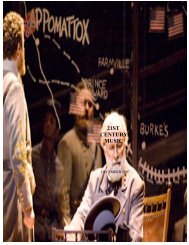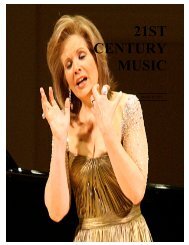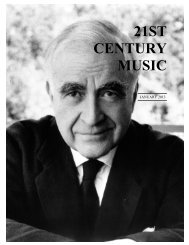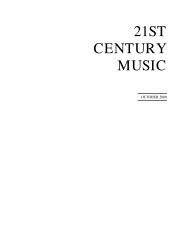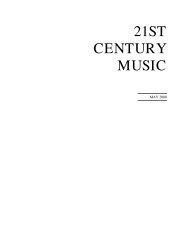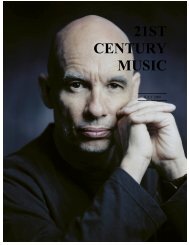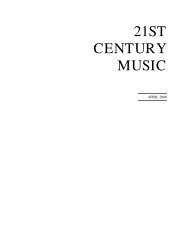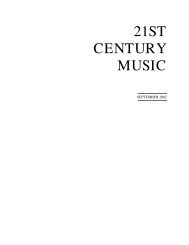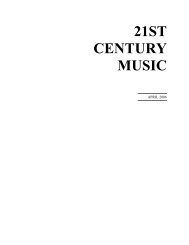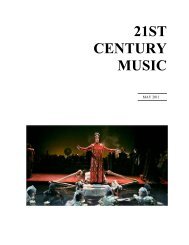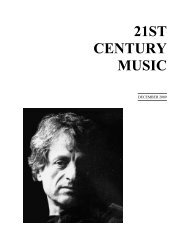Create successful ePaper yourself
Turn your PDF publications into a flip-book with our unique Google optimized e-Paper software.
LANG: It's not a primitive culture. It's a primitive urban<br />
culture.<br />
ALBURGER: Urban primitive. So that's where it came<br />
from<br />
LANG: That's where it came from. And we did it as a joke.<br />
We did this 12-hour festival, and we called it, as a joke, the<br />
"First-Annual" Bang on a Can Marathon.<br />
ALBURGER: This journal was sort of founded as a joke. It's<br />
still kind of a joke!...<br />
LANG: It works!<br />
ALBURGER: And Bang on a Can started in...<br />
LANG: ...'86, and the first marathon was in the spring of '87,<br />
and for the first three years it was just the marathon.<br />
ALBURGER: Which is a great idea.<br />
LANG: We thought, "You can't be a curmudgeon if you hear<br />
30 pieces." It's like going to the circus.<br />
ALBURGER: You've got to like something!<br />
LANG: Yes! That was the idea. The point was to say, "Here<br />
is the best of the people who are trying to be experimental --<br />
or be innovative -- in the academic world. Here is the best of<br />
the people who are trying to be innovative in the<br />
improvisation world... or in the downtown world... or in the<br />
minimal world." The whole point was to re-categorize music,<br />
not by ideology, not by whether or not something was made<br />
with a tone-row or with a minimal process, but just to say,<br />
"The composers who are innovative, wherever they are, in<br />
whatever aspect of the music world -- those are the composers<br />
we're interested in. If someone attempts to do something<br />
fresh, in any way, that qualifies them to be on this festival."<br />
We thought that that way -- instead of seeing people who have<br />
figured out how to solve a problem, and that was the only way<br />
to solve the problem, and that was the experience you were<br />
going to get -- you would go to this concert, and you would<br />
get nothing but raw optimism. You would get all of these<br />
people who thought, "Hey, I thought of something new!" And<br />
if it was, "I thought of something new by figuring out how to<br />
have my rhythms generate my pitches or vice versa" or "I<br />
thought of something new by figuring out how to do overtone<br />
singing into a coffee can." All those things are valid.<br />
ALBURGER: Yes. But the second one would be Sing in a<br />
Can.<br />
LANG: We all had brushes in school with people who had<br />
theoretically uncovered the only right way to write music.<br />
And whatever way someone claims is the right way to write<br />
music is the wrong way to write music.<br />
ALBURGER: Sure.<br />
LANG: I think really the greatest thing about writing music<br />
now is that nobody knows what to do. And the greatest<br />
composer in the world -- I don't care who you identify as the<br />
greatest composer -- has only found a personal solution. So<br />
you listen to Ligeti, you go, "That music is great, but it's<br />
Ligeti's solution." You listen to Andriessen, you listen to<br />
Steve Reich, Philip Glass, Elliott Carter -- these people have<br />
only found idiosyncratic solutions.<br />
ALBURGER: There is nothing like, "I have found the way to<br />
insure the supremacy of German music for the next hundred<br />
years" now. There's no ultimate solution.<br />
LANG: But, you know, that is one of the ways I was taught:<br />
that serial music is the thousand-year reich.<br />
ALBURGER: And I fall into that, too. I talked about a<br />
lineage just a few minutes ago... Indeed, styles are not like<br />
that. The world is pluralistic.<br />
LANG: But something we get from the American<br />
experimental tradition, as much as one can call a tradition of<br />
independence a tradition.<br />
ALBURGER: That's what it is.<br />
LANG: That's what it is. There's this thing we have to offer<br />
in America, which is the idea of the inspired nut who goes off<br />
and does something ridiculous, and thereby changes the world.<br />
ALBURGER: The post-romantic holy fool.<br />
LANG: That's exactly right. That's what we've got. That's<br />
our strength in the world. It's certainly not because we can<br />
act like Northern Europeans. It's not like we can inherit<br />
anything from Darmstadt and improve on it.<br />
ALBURGER:: The tradition of the trickster. It's a good role.<br />
LANG: It's a good role.<br />
ALBURGER: I'm wondering about a couple of strands of<br />
these different traditions and how they come into Bang on a<br />
Can and your work: minimalism and rock-and-roll.<br />
LANG: Well, most of us hear pop music first. Most people<br />
do. Sometimes you meet people -- like Aaron Kernis, for<br />
example -- who heard classical music before pop music. But<br />
most people are not like that. Usually when you see someone<br />
for whom that is true, you look at them and go, "Well, then,<br />
you grew up in a box. You must be a freak at some level."<br />
ALBURGER: But our own culture is a box, too. And that<br />
freak could be O.K., too, because that's part of the fool<br />
tradition.<br />
LANG: It's fine. It's perfectly fine to be that kind of a freak.<br />
I don't know anyone, except possibly Aaron, who is that way.<br />
ALBURGER: Well, we've just met!<br />
9



